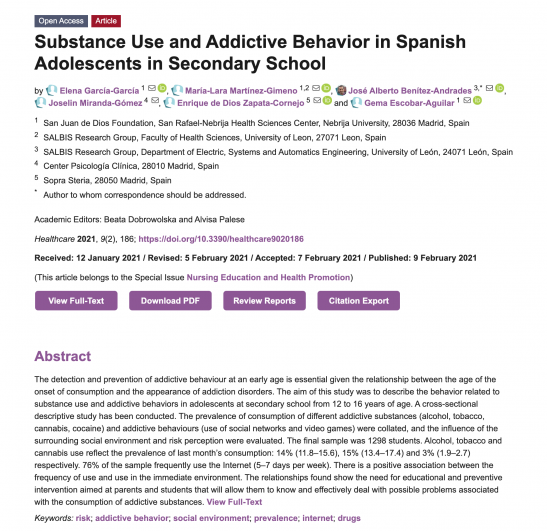Substance Use and Addictive Behavior in Spanish Adolescents in Secondary School
1 San Juan de Dios Foundation, San Rafael-Nebrija Health Sciences Center, Nebrija University, 28036 Madrid, Spain
2 SALBIS Research Group, Faculty of Health Sciences, University of Leon, 27071 Leon, Spain
3 SALBIS Research Group, Department of Electric, Systems and Automatics Engineering, University of León, 24071 León, Spain
4 Center Psicología Clínica, 28010 Madrid, Spain
5 Sopra Steria, 28050 Madrid, Spain
* Author to whom correspondence should be addressed.
Academic Editors: Beata Dobrowolska and Alvisa Palese
Healthcare 2021, 9(2), 186; https://doi.org/10.3390/healthcare9020186
Received: 12 January 2021 / Revised: 5 February 2021 / Accepted: 7 February 2021 / Published: 9 February 2021
(This article belongs to the Special Issue Nursing Education and Health Promotion)
The detection and prevention of addictive behaviour at an early age is essential given the relationship between the age of the onset of consumption and the appearance of addiction disorders. The aim of this study was to describe the behavior related to substance use and addictive behaviors in adolescents at secondary school from 12 to 16 years of age. A cross-sectional descriptive study has been conducted. The prevalence of consumption of different addictive substances (alcohol, tobacco, cannabis, cocaine) and addictive behaviours (use of social networks and video games) were collated, and the influence of the surrounding social environment and risk perception were evaluated. The final sample was 1298 students. Alcohol, tobacco and cannabis use reflect the prevalence of last month’s consumption: 14% (11.8–15.6), 15% (13.4–17.4) and 3% (1.9–2.7) respectively. 76% of the sample frequently use the Internet (5–7 days per week). There is a positive association between the frequency of use and use in the immediate environment. The relationships found show the need for educational and preventive intervention aimed at parents and students that will allow them to know and effectively deal with possible problems associated with the consumption of addictive substances. View Full-Text

